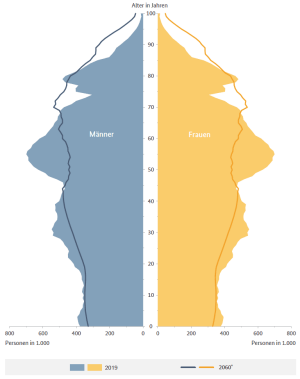
The age structure of the German population (2019 & 2060) separately for women and men with moderate development of birth rates, life expectancy, and net migration (2019).
Graphic: Bundesinstitut für Bevölkerungsforschung; Statistisches BundesamtFor more than 150 years, life expectancy in wealthy nations has been rising continuously by around three years per decade. Although a certain plateau effect is currently noticeable, we can assume that the majority of children born in Germany today will reach the age of around 90.
This generally positive development is leading to fundamental changes in our population structure. Although we understand these mechanisms scientifically and every individual is also aware of this high life expectancy, both the personal and the societal implications of this development have not yet reached the consciousness of our society and are still far too little understood. This societal challenge requires a solution that affects personal behavior. Currently, an aging society is associated with generally negative consequences for the health care system, retirement insurance, urban planning and our society. Overall, this development, which is positive in itself, leads to uncertainty and negative attitudes because insufficient models exist so far on how to deal effectively with this change. Improving health and creating age-friendly living spaces can enable greater involvement of older people in society, from which everyone involved benefits through the sharing of experience and social exchange.









